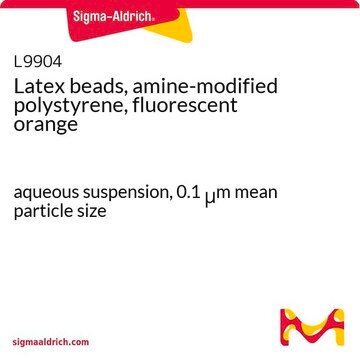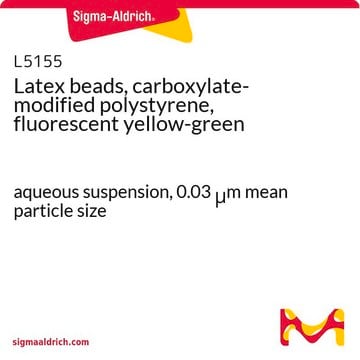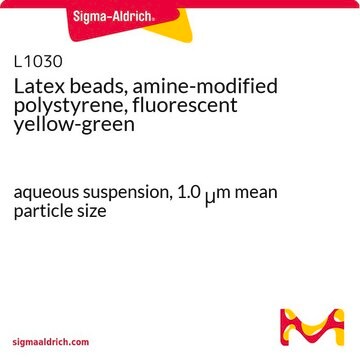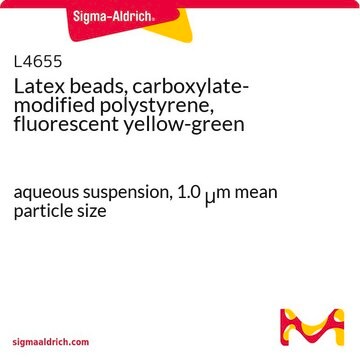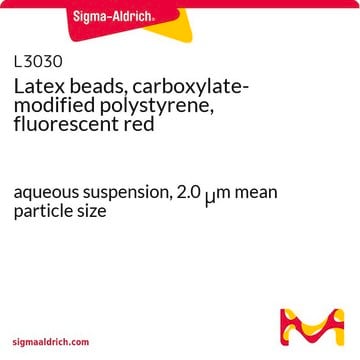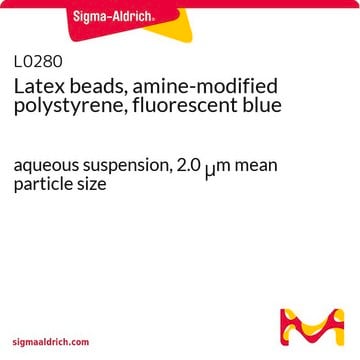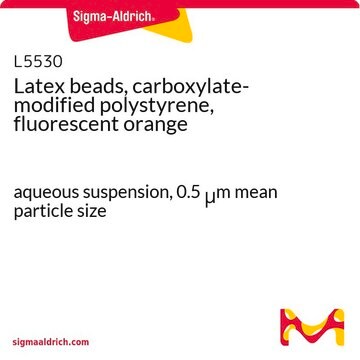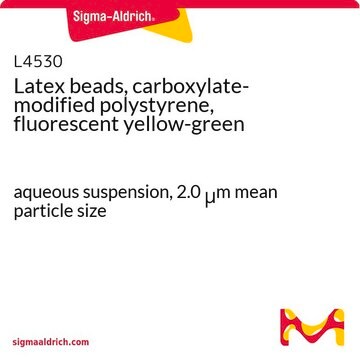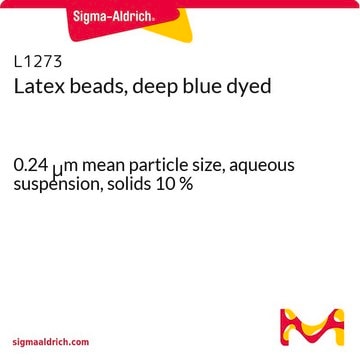L0780
Latex beads, amine-modified polystyrene, fluorescent blue
aqueous suspension, 0.05 μm mean particle size
Iniciar sesiónpara Ver la Fijación de precios por contrato y de la organización
About This Item
Productos recomendados
form
aqueous suspension
composition
Solids, 2.5%
technique(s)
cell based assay: suitable
mean particle size
0.05 μm
fluorescence
λex ~360 nm; λem ~420 nm
application(s)
cell analysis
¿Está buscando productos similares? Visita Guía de comparación de productos
Application
Latex beads, amine-modified polystyrene, fluorescent blue has been used:
- to study its effects on the concentration-response relationship of bacterial cell viability
- in the preparation of nanoparticles
- as a model nanoparticle to study interactions with human blood and platelets
Biochem/physiol Actions
Polystyrene latex beads can be used to create latex agglutination systems. Polystyrene latex beads have been used to study the transmission of Mycobacterium leprae, the causative pathogen of leprosy, as well as to develop a method for mass screening for both pulmonary and extrapulmonary tuberculosis.
Storage Class
10 - Combustible liquids
wgk_germany
WGK 3
flash_point_f
Not applicable
flash_point_c
Not applicable
Certificados de análisis (COA)
Busque Certificados de análisis (COA) introduciendo el número de lote del producto. Los números de lote se encuentran en la etiqueta del producto después de las palabras «Lot» o «Batch»
¿Ya tiene este producto?
Encuentre la documentación para los productos que ha comprado recientemente en la Biblioteca de documentos.
Los clientes también vieron
Catherine McGuinnes et al.
Toxicological sciences : an official journal of the Society of Toxicology, 119(2), 359-368 (2010-12-03)
There is evidence that nanoparticles (NP) can enter the bloodstream following deposition in the lungs, where they may interact with platelets. Polystyrene latex nanoparticles (PLNP) of the same size but with different surface charge-unmodified (umPLNP), aminated (aPLNP), and carboxylated (cPLNP)-were
INDUCTION OF EPIGENETIC RESPONSE TO AMINO-MODIFIED POLYSTYRENE NANOPARTICLES IN HUMAN CELLS
Koprinarova M, et al.
Comparative clinical pathology, 71(10) (2018)
J Geys et al.
Toxicology letters, 160(3), 218-226 (2005-09-03)
Recent studies indicate that inhaled ultrafine particles can pass into the circulation. To study this translocation in an in vitro model three types of pulmonary epithelial cells were examined. The integrity of the cell monolayer was verified by measuring the
Optical signatures of small nanoparticles in a conventional microscope.
Eann A Patterson et al.
Small (Weinheim an der Bergstrasse, Germany), 4(10), 1703-1706 (2008-09-10)
J-M Gineste et al.
Journal of microscopy, 243(2), 172-178 (2011-03-08)
The forward scattering of light in a conventional inverted optical microscope by nanoparticles ranging in diameter from 10 to 50nm has been used to automatically and quantitatively identify and track their location in three-dimensions with a temporal resolution of 200ms.
Nuestro equipo de científicos tiene experiencia en todas las áreas de investigación: Ciencias de la vida, Ciencia de los materiales, Síntesis química, Cromatografía, Analítica y muchas otras.
Póngase en contacto con el Servicio técnico
